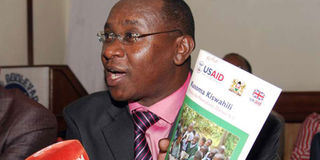Release of books for new curriculum delay ahead of opening day

Kenya Publishers Association chairman Lawrence Njagi displays one of the books published through the funding of USAID, during a press conference at Boulevard Hotel in Nairobi on March 12, 2014. The agency is producing textbooks for the new curriculum. PHOTO | SALATON NJAU | NATION MEDIA GROUP
What you need to know:
- Mr Maiyo also said they supported the new textbook policy, saying it will reduce the burden on parents.
- The government is taking over the task of buying textbooks for schools in order to address the wide gap in the student to textbook ratio.
With five days left for schools to reopen for the new academic year, publishers have asked for more time to produce the textbooks that will be used.
The publishers were supposed to produce the books for Class One to Three under the new curriculum as well as those for Class Seven and Eight and also for Form One to Four, which will be procured by the government and delivered to schools.
Kenya Publishers Association Chairman Lawrence Njagi said they will require two weeks after schools open on Tuesday for them to deliver the books.
“We are already publishing the books. We have six textbooks for each subject.
"However, we have some subjects that only managed to get two publishers and that means we will have to resubmit their bids which may take time,” Mr Njagi said.
BOOKSHOPS
Form One students, who will report to school between January 9 and 12, will be issued with six textbooks; for mathematics, English, chemistry, physics, biology and Kiswahili.
In Nairobi, business was usual for booksellers who opened their shops early in anticipation of the shoppers seeking affordable schoolbooks, diaries and book covers.
A spot check by the Nation revealed that business for most of the stationery shops was yet to pick up.
Shoppers queued at bookshops with most reading from lists of the recommended books.
The government is taking over the task of buying textbooks for schools in order to address the wide gap in the student to textbook ratio.
“We will not go back on the new textbook policy,” Education Cabinet Secretary Fred Matiang’i said recently.
BOOK DISTRIBUTION
He noted that most schools had not attained the 1:1 pupil to textbook ratio despite the colossal amounts of money the school had received.
Under the plan, the government hopes to save the taxpayer Sh13.8 billion as it will now cost Sh7.5 billion down from the previous Sh21.4 billion.
Every learner will receive a copy of the textbook for each subject under the programme.
And each primary school will receive five copies of the teacher’s guide for each subject while every secondary school will receive 10 copies of the teacher’s guide for each subject.
HEAD TEACHERS
On the raging debate of transfer of 557 head teachers across the country by the Teachers Service Commission (TSC), acting Eldoret Diocese Bishop Morris Crowley has joined those opposed to the move.
He said the commission bypassed the Church in making key decisions concerning the sector.
Bishop Crowley warned that the move will negatively affect student performance in the entire country if not put off.
He said churches were key stakeholders in the education sector and should be consulted prior to implementation of new policies if they are to be successful.
“I am disappointed by the Education ministry’s move to transfer teachers on grounds of Kenya Certificate of Secondary Education examination results,” Bishop Crowley, also the Kitale Catholic bishop, said.
ELECTION
However, Education Committee chairman in the National Assembly, Mr Julius Melly, supported the transfers, saying it was the responsibility of the commission to make such decisions.
“Transfers happen in every institution and, therefore, we should not be quick to criticise TSC,” Mr Melly said.
National Parents Association Chairman Nicholas Maiyo said they had been pushing for the transfers for more than three years.
“As parents, we wish to state that this process is long overdue. In fact, we have been calling for the exercise to be rolled out for more than three years.
"The country is emerging from a heavily divisive General Election and we wish to make it clear that we fully support this process that is helping in our national cohesion,” Mr Maiyo said when he addressed journalists in Eldoret.
FEES
Further, he asked schools not to introduce extra fees as the national government moves to implement the free day secondary school education programme in January.
He also asked the school’s management not to inflate fees as parents prepare to take their children back to schools from next week.
“Our association is ready to monitor and report to the relevant authorities any school that will charge extra fees.
"We urge our teachers to embrace this (free day) programme and work hard to ensure that it succeeds,” he said.
In November, the government announced scrapping of the Sh9,374 – which each student in public day secondary schools has been paying per year – to pave way for complete free day secondary education starting January.
FREE LEARNING
The ministry also released the school fees guidelines that will see parents with students in boarding schools category A (national and county schools) now pay Sh53,554 a year and those with learners in category B (boarding schools and extra-county schools) charged Sh40,535.
The government has allocated Sh25 billion for the free secondary school education programme to ensure a 100 per cent transition from primary to secondary school.
Mr Maiyo also said they supported the new textbook policy, saying it will reduce the burden on parents.
“In some cases, parents have had to buy between five and 10 books for one subject.
"We, therefore, view this as the best move towards achieving a pupil-textbook ratio of 1:1,” the chairman said.
Reported by Ouma Wanzala, Agewa Magut, Titus Ominde and Stanley




